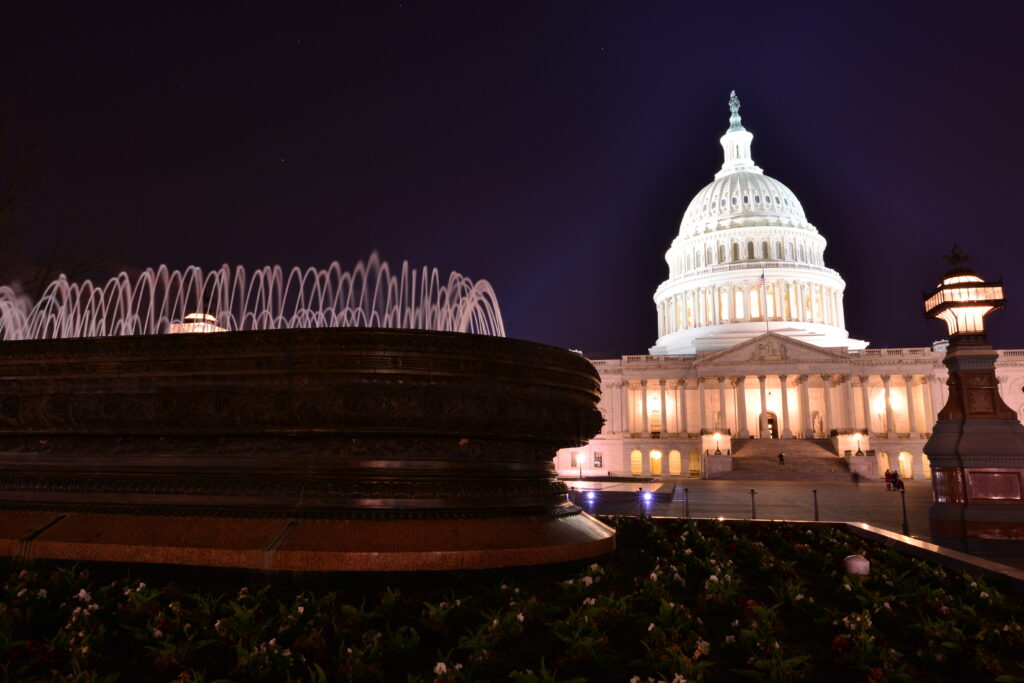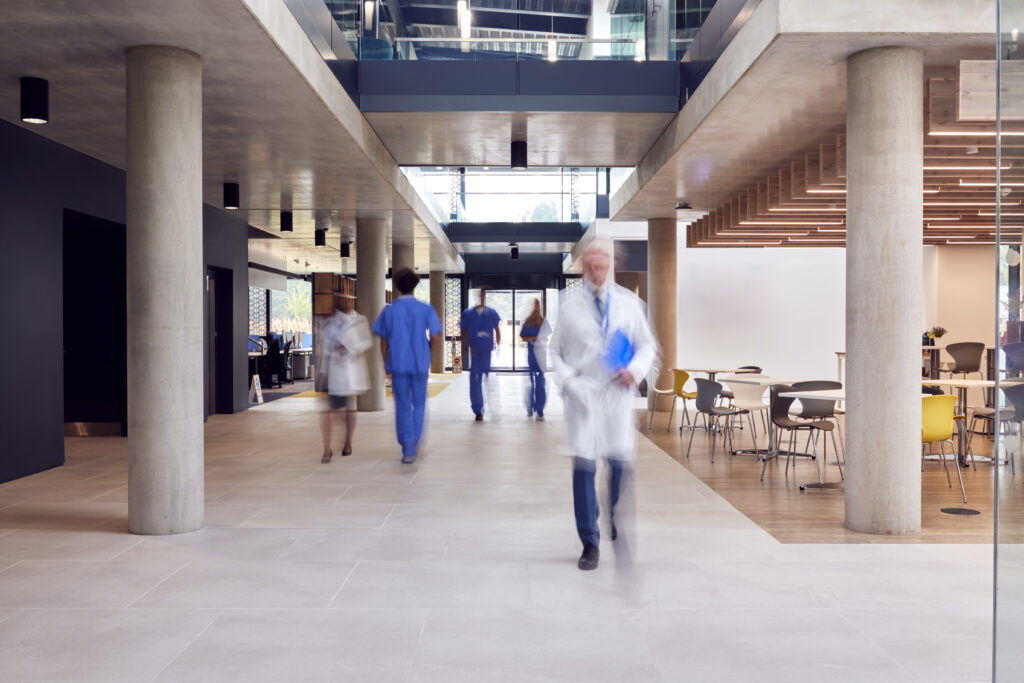
The Shutdown Impact on Hospitals
As Washington political gridlock keeps the nation in yet another federal shutdown, hospitals across Florida are bracing for ripple effects that could strain budgets and

Lexington Regional Health Center prepares for the long winter night on Christmas Eve.
It won’t be dinner as usual tonight. It is promised to be more festive and elegant, with oyster and potato soup as options. Dressed in scrubs and some wearing their whitecoats, they will shuffle into the cafeteria and settle in for a traditional holiday feast, well aware that tonight, as in years past, they can expect a few more emergencies related to holiday travel.
It’s the night before Christmas at Lexington Regional Health Center in Lexington, Neb., situated just off of Highway 80. In the past, snow and ice have kept emergency personnel busy at this time of year. Tonight, however, the weather is expected to be partly cloudy with an overnight low of 13 degrees. Snow and flurries are expected tomorrow – Christmas Day.
“As we think about the holidays and Christmas Eve in particular, we know that we will still see roughly the same amount of emergencies (maybe a few more),” says Leslie Marsh, Lexington’s chief executive officer, who last year was named in Becker’s Hospital Review as one of the nation’s top 130 women working in healthcare. “This means that our radiology and lab must remain open and staffed as they are every day. Normally, the lab and radiology departments are staffed until midnight then they are ‘on-call’ until the next morning at 7 a.m.”
Although the hospital’s urgent care unit usually remains open until 8 p.m., tonight, on Christmas Eve, the operation will be closing down at 6. And this situation could result in more emergency department (ED) visits, says Marsh, noting that the ED is staffed, as usual, with physicians who are on campus and available 24/7.
“The med-surg and OB floor will be staffed as they normally are, and we will have anesthesia and OB on call as well,” Marsh said. “Many of the tasks (on Christmas Eve) will involve ensuring that there is adequate staffing – so if there is increased activity on the floor, we may need to call for extra help.”
Tonight, the staff will be preparing for automobile accidents, expecting more trauma visits than usual. The hospital is located adjacent to Interstate 80 and is near a busy intersection.
“We have a trauma call protocol so that will be activated as it normally is,” Marsh explained. “We (also) have Somali and Hispanic interpreters in-house until 6 p.m., then they go ‘on-call.’”
Marsh says the hospital’s primary service area is a diverse community represented by 43 counties.
“We welcome them, one and all,” she said.
The more rural areas run north and south of the hospital and include towns such as Cozad, Gothenburg, Brady, Eustis, Elwood, Overton, Curtis, Elm Creek, Sumner, Oconto, and Broken Bow.
“Three of these communities have a critical access hospital (CAH), but we provide a wide array of services,” Marsh said. “Many communities, like Broken Bow, have stopped providing OB services, so we do see some people for those services. We have an urgent care and that pulls people from as far west as Brady and east to Kearney.”
Those who are dining tonight in the cafeteria likely didn’t work last Christmas Eve, as the hospital trades off holidays. They’ll also receive holiday pay and won’t work next Christmas Eve.
“We understand that illness and emergencies don’t recognize holidays,” Marsh said. “While we provide the same services as we do every day of the year, it is a nice time to recognize those people who give their lives to serve others; so it is a great time to remind patients and visitors, along with your friends and neighbors, to thank or give a shout-out to their healthcare provider.”
Marsh calls the doctors, physician assistants, nurse practitioners, nurses, and radiology techs “purpose-driven angels (who) chose to work in healthcare to help others.”
“One team member, who was working on Thanksgiving, responded to a visitor’s question this way (about not being with family on Thanksgiving): ‘this is my second family, and it is rewarding and gratifying to spend time with my work family helping people in need of care,’” Marsh recalled. “I was sharing this story with our leadership team, thanking them for their commitment to service, and they said: ‘well, we enjoy our colleagues – imagine how the patient and their family feel: these are the people that suffer most. They are obviously sick and or injured; many of them are suffering. It is the people we care for that are negatively impacted by spending time in or at the hospital during the holidays.”
“If we can make their day, night, or hour just a little better, then we benefit,” Marsh said. “We wish everyone a safe holiday season regardless of the holidays they recognize and celebrate.”


As Washington political gridlock keeps the nation in yet another federal shutdown, hospitals across Florida are bracing for ripple effects that could strain budgets and

When Medicare introduced the Prospective Payment System (PPS) in the 1980s, it was billed as a revolution. Hospitals would be paid the same flat amount
Please log in to your account to comment on this article.

Sepsis sequencing continues to challenge even experienced coding and CDI professionals, with evolving guidelines, documentation gaps, and payer scrutiny driving denials and data inconsistencies. In this webcast, Payal Sinha, MBA, RHIA, CCDS, CDIP, CCS, CCS-P, CCDS-O, CRC, CRCR, provides clear guideline-based strategies to accurately code sepsis, severe sepsis, and septic shock, assign POA indicators, clarify the relationship between infection and organ dysfunction, and align documentation across teams. Attendees will gain practical tools to strengthen audit defensibility, improve first-pass accuracy, support appeal success, reduce denials, and ensure accurate quality reporting, empowering organizations to achieve consistent, compliant sepsis coding outcomes.

Expert presenters Kathy Pride, RHIT, CPC, CCS-P, CPMA, and Brandi Russell, RHIA, CCS, COC, CPMA, break down complex fracture care coding rules, walk through correct modifier application (-25, -57, 54, 55), and clarify sequencing for initial and subsequent encounters. Attendees will gain the practical knowledge needed to submit clean claims, ensure compliance, and stay one step ahead of payer audits in 2026.

Accurately determining the principal diagnosis is critical for compliant billing, appropriate reimbursement, and valid quality reporting — yet it remains one of the most subjective and error-prone areas in inpatient coding. In this expert-led session, Cheryl Ericson, RN, MS, CCDS, CDIP, demystifies the complexities of principal diagnosis assignment, bridging the gap between coding rules and clinical reality. Learn how to strengthen your organization’s coding accuracy, reduce denials, and ensure your documentation supports true medical necessity.

Denials continue to delay reimbursement, increase administrative burden, and threaten financial stability across healthcare organizations. This essential webcast tackles the root causes—rising payer scrutiny, fragmented workflows, inconsistent documentation, and underused analytics—and offers proven, data-driven strategies to prevent and overturn denials. Attendees will gain practical tools to strengthen documentation and coding accuracy, engage clinicians effectively, and leverage predictive analytics and AI to identify risks before they impact revenue. Through real-world case examples and actionable guidance, this session empowers coding, CDI, and revenue cycle professionals to shift from reactive appeals to proactive denial prevention and revenue protection.

In this timely session, Stacey Shillito, CDIP, CPMA, CCS, CCS-P, CPEDC, COPC, breaks down the complexities of Medical Decision Making (MDM) documentation so providers can confidently capture the true complexity of their care. Attendees will learn practical, efficient strategies to ensure documentation aligns with current E/M guidelines, supports accurate coding, and reduces audit risk, all without adding to charting time.

Join Ronald Hirsch, MD, FACP, CHCQM for The PEPPER Returns – Risk and Opportunity at Your Fingertips, a practical webcast that demystifies the PEPPER and shows you how to turn complex claims data into actionable insights. Dr. Hirsch will explain how to interpret key measures, identify compliance risks, uncover missed revenue opportunities, and understand new updates in the PEPPER, all to help your organization stay ahead of audits and use this powerful data proactively.

Stay ahead of the 2026-2027 audit surge with “Top 10 Audit Targets for 2026-2027 for Hospitals & Physicians: Protect Your Revenue,” a high-impact webcast led by Michael Calahan, PA, MBA. This concise session gives hospitals and physicians clear insight into the most likely federal audit targets, such as E/M services, split/shared and critical care, observation and admissions, device credits, and Two-Midnight Rule changes, and shows how to tighten documentation, coding, and internal processes to reduce denials, recoupments, and penalties. Attendees walk away with practical best practices to protect revenue, strengthen compliance, and better prepare their teams for inevitable audits.

As AI reshapes healthcare compliance, the risk of biased outputs and opaque decision-making grows. This webcast, led by Frank Cohen, delivers a practical Four-Pillar Governance Framework—Transparency, Accountability, Fairness, and Explainability—to help you govern AI-driven claim auditing with confidence. Learn how to identify and mitigate bias, implement robust human oversight, and document defensible AI review processes that regulators and auditors will accept. Discover concrete remedies, from rotation protocols to uncertainty scoring, and actionable steps to evaluate vendors before contracts are signed. In a regulatory landscape that moves faster than ever, gain the tools to stay compliant, defend your processes, and reduce liability while maintaining operational effectiveness.
Happy National Doctor’s Day! Learn how to get a complimentary webcast on ‘Decoding Social Admissions’ as a token of our heartfelt appreciation! Click here to learn more →
CYBER WEEK IS HERE! Don’t miss your chance to get 20% off now until Dec. 1 with code CYBER25
CYBER WEEK IS HERE! Don’t miss your chance to get 20% off now until Dec. 2 with code CYBER24